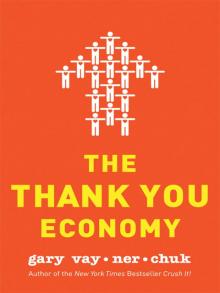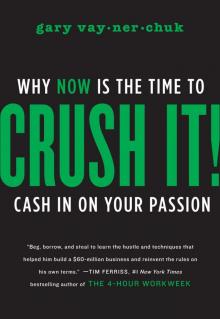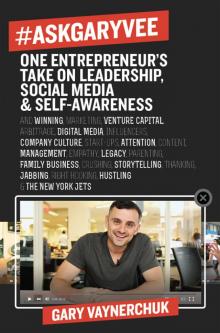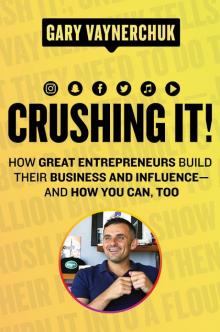- Home
- Gary Vaynerchuk
Crush It! Page 9
Crush It! Read online
Page 9
8. Start pumping out content. Let’s say you’re charismatic and have good screen presence and decide to do a series of videos called Fun Facts from the CPA. Every night you post a video of yourself explaining tax rules in your unique, informative, entertaining way, educating your audience yet also revealing why you are passionate about what some might think a dry, esoteric subject. Talk about whatever you like, as long as it doesn’t get you in trouble with your parent company. For example, explain how the recent change in the presidential administration might affect the ordinary taxpayer. What really happens if a person misses the April 15 deadline? What strategic fiscal issues should a small company consider before deciding to grow? Put as much content out there as you can. There are people in your field who will hate you because you’ll be offering up information for free for which they often charge. That’s okay. When viewers need accounting help, whom are they going to want to do business with, the guys who hoarded information or the person who proved himself to be open and honest and generous?
Find a way to incorporate some personal stories and details into your posts. Use anecdotes from your own life to illustrate concepts. Let your personality shine so that eventually people who have no need for accounting information are coming to hear you just because it’s you.
9. Tweet or post your content via Ping.fm or TubeMogul to distribute it to all of your chosen platforms.
10. Go to Search.Twitter and start searching accounting terms, like “taxes,” “401(k),” “accounts payable,” and anything else that might be relevant to your blog topic. Start following many of these, keeping in mind that Twitter does not allow you to follow more than 10 percent of the people who are following you, or better yet, @reply them publicly.
11. Next, go to Blogsearch.Google.com (or go to Google, click on “More,” and choose “Blogs” from the pull-down menu). Start typing in general terms, like “taxes” and “filing,” and search all the obvious keywords. For every blog where you find a mention of these terms, you’re going to leave a comment and your name, which should be linked to your homepage.
12. Search the term “accountant” on Facebook. Click on the tab for “All Results,” then click on “Pages.” There are hundreds of fan pages, some with nine members, some with thousands. Join as many active ones as possible, but make sure to keep track of them all. When you’re done, hit the tab for “Groups” and do the same thing. Although I don’t recommend creating your own group, there’s no reason you shouldn’t get your name on any preexisting ones that are relevant to your passion.
13. Rinse and repeat.
You will do steps 5 and 8 through 12 over and over and over again for as long as your brand exists. If that sounds tedious or repetitive, just close this book and go do your best to enjoy the life you’ve got because you’re not cut out for this. If you’re willing to hustle, though, you’ll find you don’t get tired of the hunt because every conversation you start up is another opportunity to talk about something you love more than anything else. What’s boring about that?
a few additional steps
1. Don’t forget to include a list of all of your social network links (such as Twitter.com/GaryVee) on your e-mail signature, letterhead, and business cards.
2. Make sure you have a big fat button on your site that says, “Want to Do Business with Me?” or something along those lines.
We’re thinking of this brand building as a marathon, not a sprint, right? So right now, that button will just be there as a reminder of where you’re ultimately going with your brand. It’s unlikely you’re going to get biz dev offers right off the bat, but you never know. More likely, as you build your community you will see the following progression:
Enthusiastic fans
Free product offers from businesses that notice your growing fan base
Biz dev deals from individuals smart enough to see they need to do business with you while you’re still affordable
One of my favorite mantras is “Anything is better than zero,” but true to my contradictory nature, let me just say that the longer you hold out to monetize your blog, the better. Everyone’s financial situation is different and you may feel compelled to take some of the first offers you get, from advertisers, for example. Try to wait, not just because the stronger and bigger your audience, the more cash you can demand when the time is right, but because as soon as you start focusing on monetizing, by necessity you will start to pay less attention to your content and your community.
When you’re ready, though, the opportunities to monetize your personal brand will blow your mind.
eleven
start monetizing
Up until now you’ve been focusing on building your brand by creating killer content and getting that content some traction by building your community one e-mail, one comment, one tweet, one status update at a time. Once you feel you’ve grown to a point where your brand is sticky and your audience has made your content a regular, even necessary, part of their community and their online experience, you can start to actively create revenue streams. Unlike in the beginning, when you threw out a big net into a big pond to capture in as many members of the social media school of fish as possible, you’re now going to drop in your line to a variety of smaller ponds. Be patient. In time, if you continue to hustle, you’ll grow your presence and improve your skills to the point where the fish—really, really big fish—will be jumping straight into your hands.
Some revenue ponds to consider include the following.
advertising
A lot has been made of the fact that magazines and newspapers are being crippled because companies are pulling their ads to save money during this recession. Well, of course they are; the cost of radio, magazine, and newspaper advertising space is not in line with the returns in today’s world. But companies need to sell if they’re going to stay alive, which means that even if their budgets are somewhat smaller than they used to be, they have to spend money to remind consumers they exist. If they want to sell a product, they have to advertise. The difference now is that they’re not going to waste their money by throwing it against the wall and seeing what sticks. There are hundreds of billions of dollars in ad revenue out there that need a place to go, and they’re winding up online because it’s the best return on investment advertisers can find. Remember, where people—consumers—go, money follows, and the people are spending more and more time in the blogosphere. If there’s an active, energetic, passionate community spending time on your blog, there is no reason on Earth why advertisers wouldn’t want to spend a portion of all that ad revenue there, too.
For example, you’re Sally Gardener from upstate New York. You’ve decided to monetize your passion—vegetable gardens. You’ve left comments and started conversations with thousands of other avid gardeners and gained some traction as the most expert and entertaining vegetable gardener online. You’re good. Really good. People who couldn’t tell the difference between a sprig of parsley and cilantro have come to your site to watch the episode where you use a water pistol to defend your last tomato from a hungry squirrel, only to lose the tomato to his partner in crime lurking behind you in the shadows.
Your first instinct when thinking of ways to bring dollars to your site might be to sign up for something like Google AdSense, which allows you to post Google advertisements related to your topic. I’m not a big fan of these because it distracts from your content and makes your page look cheap and cluttered. It also doesn’t pay that well. I’m disappointed that so many good bloggers have become dependent on it—there are far more creative avenues to pursue.
Here’s a better idea: #1—classy banner ads (à la decknet-work.net), which appear at the top or bottom of your site (don’t overdo it!). #2—Go to Google.com, search your subject matter, and check every blog and website to see which companies pay for Google AdSense ads to be posted. Cold-call every relevant company that is buying space on Google AdSense—they’re already spending the ad money on the Web, why not spend it on you
? You can find a video on this topic on GaryVaynerchuk.com: http://garyvaynerchuk.com/search/cold+call.
speaking engagements
Next, start taking steps to get on the lecture circuit. Have you any idea how many gardening conferences and flower shows go on every week in this country? Come up with an original theme or topic, call the show’s coordinators, and offer to give a talk for free. What does that get you? The same social equity as you get with your fantastic online content. It gives you a chance to (a) talk about what you love, (b) build cred, and (c) do it in front of an interested audience, one of whom might be the coordinator for another conference or garden show and who, after seeing you talk, might be compelled to pay you to speak at their venue. As for the conference where you just offered up your services for free, it may take five or six times, but if you’re any good at what you do, your audience will start expecting you to appear at these events, and the conference will eventually be willing, even happy, to pay you. It might take a while to get to that point, but you’re patient. Right?
affiliate programs
You could also consider doing an affiliate program. This is where you put a link on your site to another site that sells garden products, for example, and if someone clicks through and buys, you get a commission. This can make you some sweet cash. Think about it—a 20 percent commission of a $3,000 prefab greenhouse is $600. And what did you have to do to earn it? Not a whole lot. A good resource for affiliate marketing programs is Commission Junction. Amazon, too, has an extremely popular affiliate program, and there are many others. Just do a Google search for “affiliate programs” to find them.
* * *
One of my favorite websites is loaded with affiliates but manages to do it in a truly classy way. Check out www.uncrate.com.
* * *
One way I’d love to see more people create revenue is to create their own affiliate deal with another local business. Sally Gardener could call a local nursery and hook up a deal where she gets 10 percent of every click-through and sale to their website from her blog. For those of you who worry that this seems like selling out or mercenary, you shouldn’t put anything on your blog that you don’t believe in. Therefore, you’re not going to do an affiliate with a company whose product you wouldn’t buy yourself. In fact, one way to defuse any criticism for allowing ads or affiliate links onto your blog is to include an explanation on your site as to why you’re willing to support these particular companies. If you’re honest about why you believe in the product and why you’ve decided to allow selling opportunities on your blog, most people won’t be put off. Besides, society is getting used to product placement in movies and television; I expect we’ll be seeing more of it in all forms of media.
retail
Develop a product to sell, such as great gardening gloves, decorative objects, soaps, mosquito repellant, whatever you love and think you can do better than anyone else. Even more fun, sell schwag. Create a T-shirt for five bucks and sell it for ten. If you’ve got ten thousand readers or viewers, and maybe a thousand buy it, that’s five grand, and it cost you almost nothing to produce. Plus, now you’ve got people wearing or using or displaying something with your blog name and address, giving you free marketing and word of mouth.
articles
Hit up online and print magazines and other blogs about contributing articles. If they aren’t interested in paying you, offer to reciprocate by mentioning them on your blog. Approach food-and-nutrition nonprofits about writing for their newsletters. Talk to your local farmer’s market about contributing to their publication or blog if they don’t already have one.
seminars
Invite people to come out and garden with you and give them a chance to ask questions. Your first lessons will go for a relatively low rate, but as word gets around that you’re good and that people are seeing results in their gardens after working with you, your rates can go up. Make it an event to broaden your appeal—team up with a local chef who is also building a personal brand. Once the gardening portion of the day is done, everyone joins together to cook a terrific vegetarian lunch. Invite someone from the local food bank to give a talk about how and where people can donate food they grow in their gardens. Coordinate field trips for local schools to come spend their morning with you.
books and tv
It’s almost a cliché to remind you that good blogging can lead to book deals. From tackling every recipe in the first volume of Julia Child’s Mastering the Art of French Cooking to a satirical list of Stuff White People Like or a collection of photographs of crazy, gross food (This Is Why You’re Fat), blogs have long been a hot commodity in the publishing world and have proven their potential as bestsellers. Video blogs, too, have led to TV opportunities. Amanda Congdon, who got her start video blogging and hosting Rocketboom, has appeared on many TV shows (for a while she had a deal with ABC and HBO though it looks like that didn’t work out); Perez Hilton, celebrity blogger, had his own reality show and continues to appear on TV. Andy Samberg was a cult Internet hit with his comedy troupe Lonely Planet before becoming a star of Saturday Night Live.
consulting
As your audience grows and your blog starts to get real attention in the form of media coverage, ad revenue, and requests for speaking at functions, expect to start getting requests for tips and advice from many other gardening bloggers. At first you’ll want to offer your time for free, but if you’re sitting on a heavy knowledge base, you should eventually start to charge for your time. If you come across as legit and honest, people will respond favorably, especially since you have now “lived it.”
* * *
How would this process look if your passion were board games?
Pretty cool, actually.
1. Start a video blog called Board Game TV.
2. Send out an e-mail to everyone in your address book asking if you can borrow every game they have in their attic.
3. Review every game. Examine the packaging, the origins of the game, things you like about it, things you don’t like, the history of the game.
4. Post it with an eBay affiliate link for the game. You’ll get a commission every time someone buys from the link.
5. Do that for several months, making a little money.
6. Launch Collector Friday where you talk about a valuable or rare game you don’t even own, maybe one that’s up for sale. Interview the person selling it.
7. Knock the hell out of your content for a few months and it’s entirely possible that someone from The Today Show is going to ask you to talk about board games or your blog on their program.
8. Suddenly, you get a call from Parker Brothers asking if you’ll talk at their convention or be their spokesperson.
It could happen. Heck, it will happen.
* * *
advertising redux
Anyone who is able to build a gardening show with ten thousand viewers is perfectly justified in reaching out to the big boys. All you have to do is buy a stack of gardening magazines, flip through the pages to see who advertises, and then Twitter or Facebook status out, “Hey, BMW, why are you spending fifty grand on a full-page ad in Home and Garden and getting little return on your investment when you could place something with me for just a couple of g’s and get crazy ROI?”
create some hoopla
There’s one more thing you can do, but it takes a very particular kind of DNA to pull it off. Launch your site. Put out a few days’ worth of killer content. Pick up the phone and call big corporate advertising agencies and tell them what you’ve just done. Explain to them how your expertise and your passion are going to make this thing huge. Tell them you’re giving them an incredible chance to buy out the show for the next year while you’re still unknown. In a year you’ll be able to sell space for three grand an episode, but since you need the money now you’re looking for someone to invest and grow with you. Show support today, and you’ll repay them with undying loyalty through the course of your career.
Sounds outrageous? I�
�m telling you, that play is in play somewhere. Ten people reading this book will be able to pull it off. When you do, let me know at [email protected].
As you can see, there is lots of money to be made, albeit in dribs and drabs to begin, by siphoning off money from already-existing sources.
Some ponds I’ve mentioned are shallower than others and might not give you the kind of return you dream about right away—fifty bucks here, three hundred there. But how much is your blog earning you now? Nothing? And you’re going to turn away fifty bucks?
Say it with me: Anything is better than zero.
That doesn’t mean you should do anything to earn a buck, but neither should you walk away from dollars if you don’t have any. Too many people think they’re big shots when they’re nothing in the grand scheme of things. Don’t drink your own Kool-Aid, it will negatively impact your business decisions. Even if your ambitions are huge, start slow, start small, build gradually, build smart. The money will be there, and more important, so will the opportunities.
twelve
roll with it
You know I like contradiction, so it shouldn’t surprise you that one of the most important concepts I want you to keep in mind is diametrically opposed to some of the ideas I’ve shared with you until now.
I’ve repeated over and over that in order to build a winning business you have to go whole hog with your passion. True. I’ve said that if you don’t plan ahead and decide exactly what you want and where you want to see your business end up, you’re broken. Still true. But what is also true is that as committed and obsessed and goal oriented as entrepreneurs need to be, they also have to be willing to practice what I call “reactionary business,” which at heart is about being willing and able to adapt and change. This is where most companies and businesspeople lose the game, by refusing to admit their mistakes or neglecting to look ahead to see what could negatively impact their business. Nothing in life ever goes exactly the way you think it will, and that goes for all of your carefully planned entrepreneurial dreams and goals. Reactionary business allows you to make a couple of crucial moves when the landscape starts to change.

 The Thank You Economy
The Thank You Economy Crush It!
Crush It! #AskGaryVee
#AskGaryVee Crushing It! EPB
Crushing It! EPB Jab, Jab, Jab, Right Hook
Jab, Jab, Jab, Right Hook